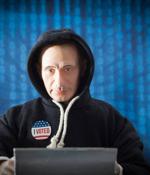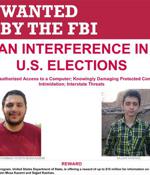Security News

Election workers in US battleground states have been hit by a surge in phishing and malware-laced emails in the run up to their primaries and the upcoming 2022 midterm elections. That's according to Trellix security researchers, who said malicious emails sent to Arizona county election workers rose 78 percent, from 617 to 1,101, between the first and second quarter of the year, ahead of the state's August 2 primary.

The Federal Bureau of Investigation warned today of foreign influence operations that might spread disinformation to affect the results of this year's midterm elections. The federal law enforcement agency warned that foreign actors are actively spreading election infrastructure disinformation to manipulate public opinion, discredit the electoral process, sow discord, and encourage a lack of trust in democratic processes and institutions.

The Federal Bureau of Investigation and the Cybersecurity and Infrastructure Security Agency in a public service announcement says that cyber activity attempting to compromise election infrastructure is unlikely to cause a massive disruption or prevent voting. "As of the date of this report, the FBI and CISA have no reporting to suggest cyber activity has ever prevented a registered voter from casting a ballot, compromised the integrity of any ballots cast, or affected the accuracy of voter registration information," PSA from the FBI and CISA. "Any attempts tracked by FBI and CISA have remained localized and were blocked or successfully mitigated with minimal or no disruption to election processes," the two agencies says in the report.

Mandiant is "Highly confident" that foreign cyberspies will target US election infrastructure, organizations, and individuals in the run-up to the November midterm elections. "We have tracked activity from groups associated with Russia, China, Iran, North Korea, and other nations targeting organizations and individuals related to elections in the US and/or other nations with apparent goals ranging from information collection and establishing footholds or stealing data for later activity to one known case of a destructive attack against critical election infrastructure," the Mandiant team said in research published today.

Google and its YouTube subsidiary have joined other social media networks pledging to keep the 2022 US midterm elections safe and free from Russian trolls - and anyone else spewing democracy-damaging disinformation - by taking down such content. The election strategies follow Google's move to ban MAGA message-board Truth Social from its Play store until the app removes content that incites violence.

TikTok has joined Twitter in publishing new US midterm misinformation rules, with considerable crossover in scope and style. Eric Han, TikTok's head of US safety, shared in a blog post that the social video platform is taking a variety of steps to provide access to authoritative information and counter election misinformation.

The Feds have put up a $10 million reward for information about foreign interference in US elections in general, and more specifically a Russian oligarch and close friend of President Vladimir Putin accused of funding an organization that meddled in the 2016 presidential elections. The bounty, offered through the US Department of State's Rewards for Justice program, specifically seeks intel on Russia's Internet Research Agency, businessman Yevgeniy Viktorovich Prigozhin, and any "Linked Russian entities and associates for their engagement in US election interference."

"As of October 2021, US election officials in at least nine states received invoice-themed phishing emails containing links to websites intended to steal login credentials." On 5 October 2021, unidentified cyber actors targeted US election officials in at least nine states, and representatives of the National Association of Secretaries of State, with phishing emails.

The U.S. government on Thursday unsealed an indictment that accused two Iranian nationals of their involvement in cyber-enabled disinformation and threat campaign orchestrated to interfere in the 2020 presidential elections by gaining access to confidential voter information from at least one state election website. The two defendants in question - Seyyed Mohammad Hosein Musa Kazemi, 24, and Sajjad Kazemi, 27 - have been charged with conspiracy to commit computer fraud and abuse, intimidate voters, and transmit interstate threats, voter intimidation, transmission of interstate threats, with Kazemi additionally charged with unauthorized computer intrusion.

The U.S. Department of Justice has unsealed charges against two Iranian nationals for cyberattacks against the U.S. 2020 presidential campaign, and there's a $10 million reward offered for information on their activities. Kazemi and Kashian allegedly breached at least one state election website and attempted to access 110 others, sent threatening emails to voters, distributed a disinformation video about election infrastructure vulnerabilities, and gained access to a U.S. media company's network, according to law enforcement.